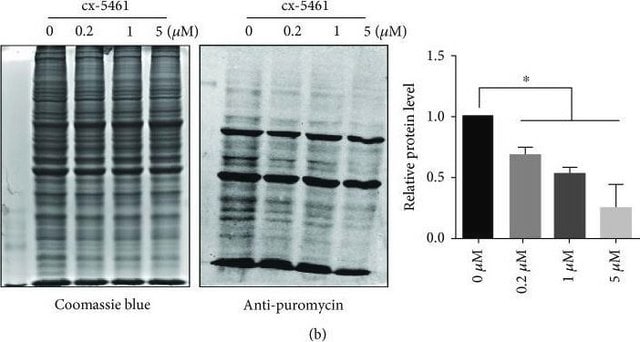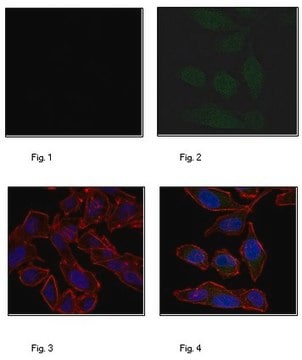おすすめの製品
由来生物
mouse
品質水準
結合体
ALEXA FLUOR™ 647
抗体製品の状態
purified antibody
抗体製品タイプ
primary antibodies
クローン
12D10, monoclonal
化学種の反応性
human
濃度
0.5 mg/mL
テクニック
immunocytochemistry: suitable
輸送温度
wet ice
ターゲットの翻訳後修飾
unmodified
詳細
ピューロマイシンは、ストレプトミセス属バクテリア由来のアミノヌクレオシド抗生物質で、リボソームの早期連鎖停止によって翻訳をブロックするタンパク質合成阻害剤として機能します。ピューロマイシンに対するモノクローナル抗体は、翻訳を直接モニタリングするための標準的な免疫化学的手法(翻訳の表面センシング(SUnSET)として知られる方法)に使用できます。この抗体がタンパク質翻訳分析に有用となっているのは、分子の一部がアミノアシル化tRNAの3′末端と類似しているためです。ピューロマイシンは、胸腺細胞およびヒトHL-60白血病細胞においてDNA断片化を誘導します。
この抗ピューロマイシン、クローン12D10は、 ピューロマイシンの検出において、免疫細胞染色での使用が検証されています。
特異性
ピューロマイシンでプレインキュベートされる際に、すべての動物種由来の細胞と反応することが予測されています。
品質
未処理およびピューロマイシン処理HeLa細胞の免疫細胞染色で評価されています。
免疫細胞染色:希釈倍率1:2,500で使用、ピューロマイシンで処理したHeLa細胞において、ピューロマイシンを組み込んだ新合成タンパク質を検出できます。
Alexa Fluor™はLife Technologiesの登録商標です。
免疫細胞染色:希釈倍率1:2,500で使用、ピューロマイシンで処理したHeLa細胞において、ピューロマイシンを組み込んだ新合成タンパク質を検出できます。
Alexa Fluor™はLife Technologiesの登録商標です。
ターゲットの説明
分子量の実測値の情報はカタログ番号:MABE343を参照してください。
法的情報
ALEXA FLUOR is a trademark of Life Technologies
Not finding the right product?
Try our 製品選択ツール.
保管分類コード
12 - Non Combustible Liquids
WGK
WGK 2
引火点(°F)
Not applicable
引火点(℃)
Not applicable
適用法令
試験研究用途を考慮した関連法令を主に挙げております。化学物質以外については、一部の情報のみ提供しています。 製品を安全かつ合法的に使用することは、使用者の義務です。最新情報により修正される場合があります。WEBの反映には時間を要することがあるため、適宜SDSをご参照ください。
Jan Code
MABE343-AF647:
試験成績書(COA)
製品のロット番号・バッチ番号を入力して、試験成績書(COA) を検索できます。ロット番号・バッチ番号は、製品ラベルに「Lot」または「Batch」に続いて記載されています。
Li Wang et al.
The British journal of nutrition, 1-11 (2023-05-29)
Se deficiency causes impaired growth of fish skeletal muscle due to the retarded hypertrophy of muscle fibres. However, the inner mechanisms remain unclear. According to our previous researches, we infer this phenomenon is associated with Se deficiency-induced high concentration of
Noga Ron-Harel et al.
Cell reports, 28(12), 3011-3021 (2019-09-19)
T cell stimulation is metabolically demanding. To exit quiescence, T cells rely on environmental nutrients, including glucose and the amino acids glutamine, leucine, serine, and arginine. The expression of transporters for these nutrients is tightly regulated and required for T cell activation.
Hongcheng Cheng et al.
Nature metabolism, 5(2), 314-330 (2023-01-31)
The accumulation of acidic metabolic waste products within the tumor microenvironment inhibits effector functions of tumor-infiltrating lymphocytes (TILs). However, it remains unclear how an acidic environment affects T cell metabolism and differentiation. Here we show that prolonged exposure to acid
Seema Qamar et al.
Cell, 173(3), 720-734 (2018-04-21)
Reversible phase separation underpins the role of FUS in ribonucleoprotein granules and other membrane-free organelles and is, in part, driven by the intrinsically disordered low-complexity (LC) domain of FUS. Here, we report that cooperative cation-π interactions between tyrosines in the
Michal Scur et al.
Nature communications, 13(1), 7272-7272 (2022-11-27)
Alveolar macrophages (AM) hold lung homeostasis intact. In addition to the defense against inhaled pathogens and deleterious inflammation, AM also maintain pulmonary surfactant homeostasis, a vital lung function that prevents pulmonary alveolar proteinosis. Signals transmitted between AM and pneumocytes of
ライフサイエンス、有機合成、材料科学、クロマトグラフィー、分析など、あらゆる分野の研究に経験のあるメンバーがおります。.
製品に関するお問い合わせはこちら(テクニカルサービス)







